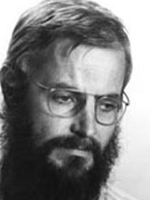
1984 Nobel Prize in Physiology or Medicine
Georges Köhler (*1946 – †1995) received the Nobel Prize for his theory of the specific structure and control of the immune system and the discovery of the principle governing the production of monoclonal antibodies. (with Nils Kaj Jerne and César Milstein)
Georges J. (Jean) F. (Franz) Köhler, born in Munich, received the Nobel Prize at the young age of 38. He was only 48 years old when he died and was at the apex of his scientific career.
Köhler studied biology in Freiburg from 1965 to 1971. In 1974 he earned his doctorate here with a dissertation on immunology. Until 1984, Köhler worked at the Basel Institute for Immunology, founded by Niels Kaj Jerne.
Together with Jerne and César Milstein – the three received the Nobel Prize jointly in 1984 – Köhler developed a procedure for the production of so-called monoclonal antibodies. Köhler and Milstein conducted the decisive experiment in Cambridge in 1975, fusing white blood cells and tumor cells together. The hybrid cells created in this way produced antibodies and divided into genetically identical daughter cells. In the publication of their findings in 1974, Köhler and Milstein referred to the great potential their discovery would have for medical and industrial applications. Today, monoclonal antibodies play a vital role in medical diagnostics and therapy.
From 1984 until his untimely death, Köhler served both as director of the Max Planck Institute of Immunobiology in Freiburg and as professor of the University of Freiburg. The German Society of Immunology has awarded a Georges Köhler Prize each year since 1998.







